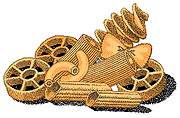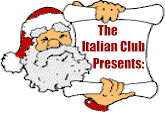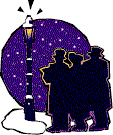Il Presepe
Parla Italiano?
Cecco Angiolieri
La Rondine is published monthly by The Italian Club of St. Louis
President
Franco Giannotti
Internet Edition

|
|
|
|
|
|
|
Annual Christmas Party We have planned a special evening and dinner for our members and guests. First - A Christmas
Program The Club's own Panettone Players will perform their original and unique adaptation of La Storia di Natale, L'ultimo spirito, translated from the world famous A Christmas Carol by Charles Dickens. This history-making performance will mark the first time that Dickens' work has been performed in Italian in St. Louis. Then - A Special Dinner A first course of pasta with marinara sauce, followed by mixed salad and a choice of veal with a sauce of mushrooms and white wine, or chicken with cheese and prosciutto, or sole piccata, mixed vegetables, and dessert (spumoni, biscotti, and cannoli), two bottles of wine per table, coffee, rolls. Finally - A visit from La Befana and a gift exchange.
Total cost for the entire evening is just $25.00 per person. Please make reservations no later than December 14 by calling Marie Wehrle at 644-1645. NOTE: Due to space limitations at Baldo's, our Christmas Program will be held at Favazza's Banquet Room, (5201 Southwest and Marconi). |
RECAP OF NOVEMBER MEETING
Machiavelli and Roman Republicanism
by George M. Pepe Chairman of the Classics Department, Washington University
| Professor Pepe discussed Machiavelli's philosophy expounded in Discorsi
sopra la prima deca di Tito Livio. To many Machiavelli's name is synonymous
with evil, cruelty, deception, and with the philosophy of "the end
justifies the means" contained in Il Principe, but he was also
a spokesman for the Republic and a civic humanitarian who believed that
violence should only be used when necessary and only for the survival of
the state. He also believed that history is a great teacher and encouraged
his contemporaries to study ancient history to learn the reason for the
success of the early Roman Republic.
In his view this success is to be attributed to the Roman character, shaped by a governmental system that allowed participation by diverse classes, such as the Patrician and the Plebeians. Tension and disagreement between the elite and the populace, while creating disorder and disagreement, also promoted the need for compromise, therefore disagreement and diversity lead to a balanced government in which ultimately freedom prevails. These principles were use by James Madison, known as the Father of the Constitution, in the drafting of the Constitution of the United States. Machiavelli also believed that a state must be strong enough to defend itself and that it must expand or perish, therefore he disapproved of Christianity, a religion which promotes suffering and self-abasement, and believed that Paganism, with its fierce gods who demanded blood and sacrifice, was more apt to promote valor and courage. In his view, religion must be subordinate to the needs of the state and develop citizens who must be ready to defend their country. |
| Niccolò Machiavelli, historian, statesman,
and political philosopher, was born in Florence on May 3, 1469. In 1498,
when the Florentine Republic was proclaimed, he entered government service
as a clerk and soon rose to prominence as secretary of Il concilio dei
dieci that conducted the diplomatic negotiations and supervised the military
operations of the republic. His duties included missions to the French
king (1504, 1510-11), the Holy See (1506), and the German emperor (1507-8).
In the course of his diplomatic missions within Italy he became acquainted
with many of the Italian rulers and was able to study their political tactics,
particularly those of the ecclesiastic and soldier Cesare Borgia, who was
at that time engaged in enlarging his holdings in central Italy.
From 1503 to 1506 Machiavelli reorganized the military defense of the republic of Florence. Although mercenary armies were common during this period, he preferred to rely on the conscription of native troops to ensure a permanent and patriotic defense of the commonwealth. In 1512, when the Medici, a Florentine family, regained power in Florence and the republic was dissolved, he was deprived of office and briefly imprisoned for alleged conspiracy against them. After his release he retired to his estate near Florence, where he wrote his most important works. Despite his attempts to gain favor with the Medici rulers, he was never restored to his prominent government position. When the republic was temporarily reinstated in 1527, he was suspected by many republicans of pro-Medici leanings. He died in Florence on June 21 of that year. His Works Throughout his career, Machiavelli sought to establish a state capable of resisting foreign attack. His writings are concerned with the principles on which such a state is founded, and with the means by which they can be implemented and maintained. In his most famous work, Il Principe (1513), he describes the method by which a prince can acquire and maintain political power. This study, which has often been regarded as a defense of the despotism and tyranny of such rulers as Cesare Borgia, is based on Machiavelli's belief that a ruler is not bound by traditional ethical norms. In his view, a prince should be concerned only with power and be bound only by rules that would lead to success in political actions. Machiavelli believed that these rules could be discovered by deduction from the political practices of the time, as well as from those of earlier periods. Machiavelli's formulation of the historical principles inherent in Roman government may be found in his Discorsi sopra la prima deca di Tito Livio (1517) a commentary on the history of Rome by the Roman historian Livy. In this study Machiavelli departs from medieval theocratic concepts of history, ascribing historical events to the demands of human nature and the effects of chance. Among his other works are: Dell'arte della guerra (1521), which describes the advantages of conscripted over mercenary troops; Istorie florentine (1525), which interprets the chronicles of the city in terms of historical causality; Vita di Castruccio Castracani (1520), the biography of the famous Italian soldier and Ghibelline leader; a number of poems, and several plays, of which the best known is La Mandragola (1524), a biting satire on the corruption of contemporary Italian society |
Vizzini Exhibit at Atrium Gallery
| An exhibit of paintings, called Art as Art, by the contemporary Italian painter Andrea Vizzini will be presented November 13 - January 9 at the Atrium Gallery, 7638 Forsyth Boulevard in St. Louis. Vizzini was born in Sicily in 1949 and is currently working in Venice. He trained in architecture and painting and is an excellent technician as well as a very successful, highly accomplished, and well-respected painter. Vizzini's paintings are represented in numerous prominent collections internationally, including the public collections of Museum Ca' Pesaro in Venice and the Landes Museum in Bonn, Germany. This exhibit is his second in St. Louis. |
The Club, through its internet home page, recently received the following
inquiry. "I  am
conducting biographical research on influential Italian-Americans and would
be grateful if the Italian Club would share any information it has on founding
directors Joseph Freschi and John Ravarino. I believe they may have developed
the Ravarino & Freschi brand of pasta and I'm very interested in how
they started their business. If the club has a historian who might share
any background with me, I'd be very appreciative. I can be contacted as
shown below. Thank you." am
conducting biographical research on influential Italian-Americans and would
be grateful if the Italian Club would share any information it has on founding
directors Joseph Freschi and John Ravarino. I believe they may have developed
the Ravarino & Freschi brand of pasta and I'm very interested in how
they started their business. If the club has a historian who might share
any background with me, I'd be very appreciative. I can be contacted as
shown below. Thank you."
Joshua Isenberg Noble & Associates 515 State St., (29th Fl.) Chicago, IL 60610 Telephone (312) 644-4600 or email josh.isenberg@noble.net |
L'angolo del presidente
by Gene Mariani
| Puleo Appointed Director
Upon being elected Club Vice President in October, Roger Gennari resigned his position as Director of the Club. In accordance with Club by-laws, in the event of the resignation of an Officer or Director, it is the responsibility of the President to appoint a replacement to serve out the remaining term of office. Peter Puleo has been appointed as Director to serve for the remaining one year of Roger's term. Cathedral Tour A Big Success Mille grazie to member Audrey Giovanni for leading a most interesting, informative, and enjoyable tour of the mosaics of the St. Louis Cathedral and of the Cathedral's Museum of Mosaics. About 30 members and friends attended the Sunday, November 1 special activity program. Addio, carissimi amici In the past several months, the Club has experienced the death of five members. We shall sorrowfully miss their presence at our meetings, their support of our activities, and their warmth and friendship. On behalf of the Club, the Officers and Directors, we wish to express our sympathy and condolences to the families of Gil Gennari, Joseph Sandretto, Connie Cuccia, Peter Viviano, and past president Ersilio Rolfi. Italian Club Translates Art on Wheels, Guide for Forest Park The Italian Club recently was proud to assist the Landmarks Association of St. Louis in the preparation of a multi-lingual guide to attractions in Forest Park and the Central West End neighborhood. The guide, which features concise descriptions of the history and architecture of sites along the route of a special Art on Wheels tour bus, has been translated into French, German, Italian, Japanese, Spanish and Vietnamese in an effort to promote international tourism, serve new residents to the area, and increase the use of public transit within and around the park. Many thanks to members Luisa Flynn and Anthony Perrone who generously donated their time and talent to the Club for the Italian translation. |
1999 CALENDAR
| January
Report by the Board to the membership on Club's 1998 performance and open discussion of issues of importance to members. February I Partigiani. Recounting of actual experience serving as Italian partisans during the last days of WW II by Club member Valerio Bianco and others. March Venice. Slide presentation by Prof. Judy Mann of the St. Louis Art Musum. April Slide presentation on WU Arezzo Program by Prof. John Garganigo and awarding of Italian Club and Southwest Bank prizes for the study of Italian language. May Slide presentation on Italian Gardens by John Karel, Tower Grove Park Director. In conjunction with the presentation there will be a special tour of the park for members and friends. June Celebration of the Italian National Day. Report by Joseph Colagiovanni, Vice Consul of Italy. Presentation of Italian Heritage Award. |
|
IL PRESEPE
Salvatore Quasimodo |
E' stato un mezzo disastro. Ho bevuto mezza bottiglia. Non amo i mezzi termini.
Ho dormito due ore e mezzo. Ho mangiato una mela e mezzo.
Erano mezzo ubriachi. Maria era mezzo vestita. (Mezzi ubriachi....mezza vestita sono forme popolari.) Tratto dal libro di Cesare Marchi Impariamo l'italiano, Rizzoli, Milano, 1984 |
OPERE DI ITALIANI AL MUSEO DI ST. LOUIS
19. Salvator Rosa. San Giovanni Battista. (Olio su tela, 1660)
| Pittore di temperamento esuberante e spirito satirico, Salvator Rosa (Arenella, Napoli, 1615 - Roma 1673) è noto soprattutto per i paesaggi, le battaglie e le vedute di fantasia, pervase da intense suggestioni romantiche e giocate su tonalità cromatiche robuste e ricche d'impasto. Fu anche poeta notevole e originale, autore di epigrammi e di sette Satire, sincere ed estrose. Il quadro nel museo di St. Louis rappresenta San Giovanni Battista in un paesaggio fantastico caratterizzato da rocce a diversi livelli, alberi lussoreggianti e un cielo con grandi cumuli nuvolosi. Vestito in modo semplice e con le spalle nude, il santo sulla destra del dipinto sta illustrando la sua predica con un gesto delle mani, che sembrano enumerare con le dita i punti del suo discorso. Una folla attenta di uomini, donne e bambini lo sta ascoltando, ma l'attenzione dell'osservatore converge sulle tre figure che sono rappresentate a sinistra, tre uomini che pare stiano soppesando o discutendo le sue parole: un fariseo, in piedi, avvolto in un manto bianco; vicino a lui, un soldato; e in primo piano, nell'atto di alzarsi, l'esattore delle imposte. |
I capolavori della poesia italiana
| 4. Cecco Angiolieri (circa 1260-1313) proveniva da una ricca famiglia guelfa senese. L'opera complessiva poggia su alcuni temi fondamentali, quali la parodia dell'amore stilnovista attraverso la rappresentazione di un credo dai toni misticheggianti centrato sulla donna, la taverna e il gioco. |
S'i' fossi foco, arderei 'l mondo
|
1 imbroglierei. 2 con un colpo dato a tondo. |


 Two
annual subscriptions to Italy Italy magazine will be given away,
along with attendance prizes. Members and guests are encouraged to bring
a gift (nominal value of $5 to $10) to exchange with one another through
the magical mediation of La Befana; however, in order to receive a gift
it is necessary to bring a gift (it's an exchange, remember).
Two
annual subscriptions to Italy Italy magazine will be given away,
along with attendance prizes. Members and guests are encouraged to bring
a gift (nominal value of $5 to $10) to exchange with one another through
the magical mediation of La Befana; however, in order to receive a gift
it is necessary to bring a gift (it's an exchange, remember).